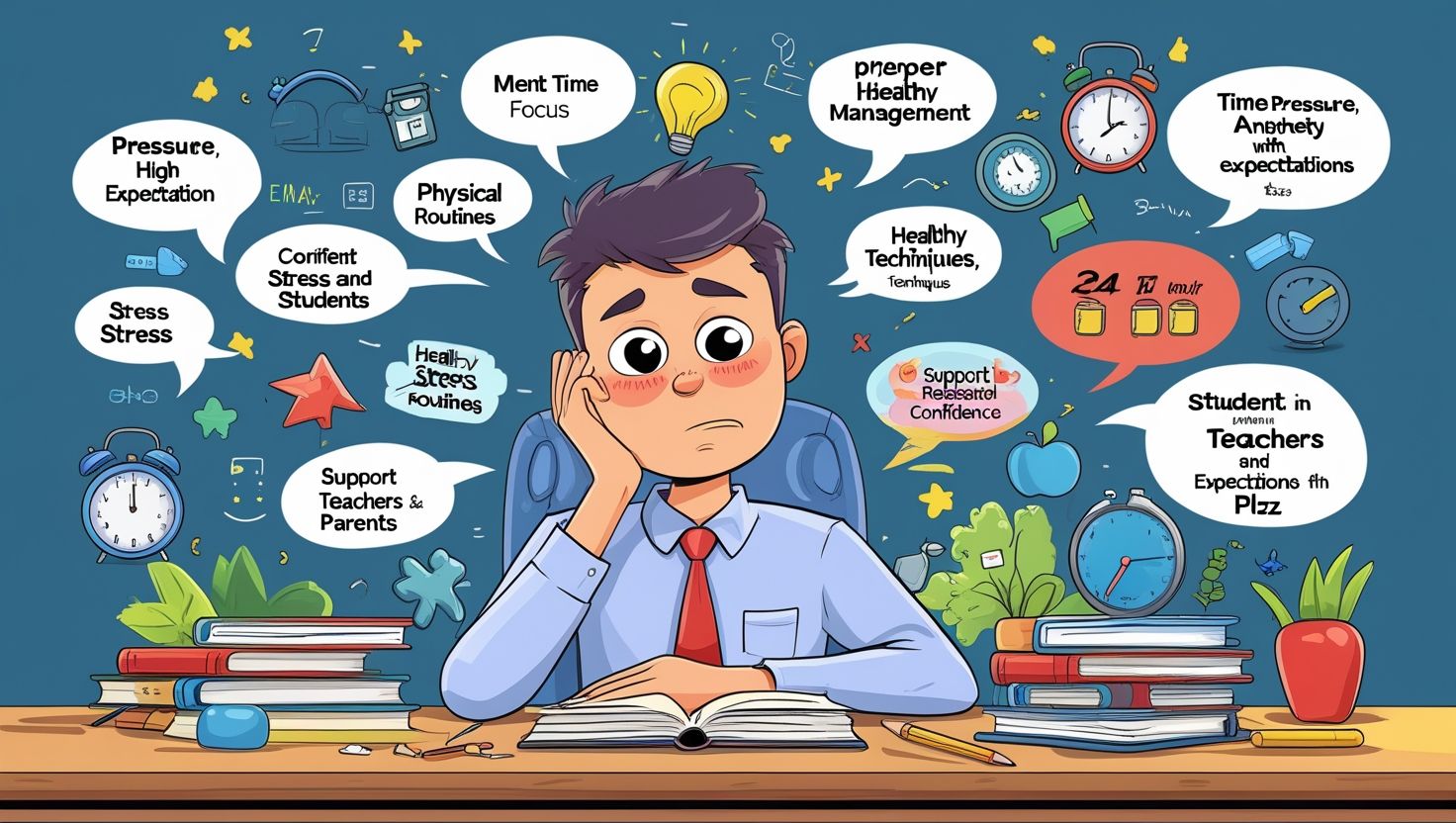Introduction
Challenges, Stress and Remedies for Exams, Exams are a common part of every student’s life, serving as a tool to assess knowledge, skills, and understanding. However, examinations also bring unique challenges that often lead to stress and anxiety. While tests are designed to encourage discipline and measure progress, the overwhelming pressure sometimes becomes a heavy burden. Many students feel nervous weeks before exams, which directly affects their preparation and overall confidence. Furthermore, the fear of failure, expectations from parents and teachers, and competition with peers increase mental strain. Despite these challenges, exams remain an important part of education. Therefore, it becomes essential to discuss not only the challenges but also the remedies that can help students overcome stress. Through proper planning, healthy habits, and positive thinking, exam stress can be minimized. This article explores exam challenges, the sources of stress, and effective remedies for students to succeed.
Common Challenges Faced During Exams
Exams often bring several challenges that students encounter before and during the process. Time management is one of the biggest issues, as students sometimes struggle to complete the syllabus or answer all questions in the limited time provided. In addition, memorization pressure often causes confusion and forgetfulness. Language barriers, unclear instructions, or complex question formats add to the difficulty. Peer competition and the desire to outperform classmates can further increase stress. Moreover, lack of proper guidance or effective study strategies makes the situation more complicated. Distractions, including excessive use of social media, reduce focus and preparation quality. Additionally, health problems such as lack of sleep or poor diet also affect performance. Students must identify these challenges early to develop coping strategies. By acknowledging the problems, they can take steps toward managing them better. Recognizing challenges is the first step toward finding effective solutions and improving exam performance.
Psychological Stress of Exams
Exams create significant psychological stress that affects the mental well-being of students. Anxiety, nervousness, and fear of failure are among the most common reactions before and during exams. Many students feel a sense of helplessness, particularly when facing subjects they find difficult. Additionally, the pressure to meet parental or teacher expectations increases emotional stress. Psychological stress also leads to problems such as lack of concentration, memory loss, and reduced confidence. Prolonged stress can even result in depression or withdrawal from studies. Some students develop negative self-talk, believing they are not capable of success, which further damages motivation. Furthermore, exam-related stress may manifest physically through headaches, stomach problems, or sleep disorders. All these factors highlight how exams impact students beyond academics. To overcome this psychological burden, students need practical stress management strategies. Understanding that stress is normal and manageable is the first step toward achieving mental stability and exam success.

Social and Family Pressures
Exams not only affect students personally but also come with social and family pressures. Many parents expect their children to achieve high grades, sometimes without considering individual abilities. This expectation creates unnecessary stress and fear of disappointing loved ones. In some cases, students compare themselves with high-achieving siblings or classmates, which lowers self-esteem. Friends and relatives may also unintentionally add pressure by asking about exam results or future plans. Furthermore, the education system often highlights grades as the main indicator of success, increasing social judgment. These combined pressures make students feel that their worth is tied only to academic performance. Consequently, they may isolate themselves, avoiding family interactions or social gatherings. Such pressures can lead to emotional distress and strained relationships. It is important for parents and teachers to provide encouragement instead of criticism. By creating a supportive environment, students feel more motivated and less stressed during exams.
Physical Effects of Exam Stress
Exam stress does not remain limited to the mind; it also causes physical health issues. Lack of sleep is one of the most common effects, as students often study late into the night before exams. Irregular sleep patterns reduce focus and memory retention. Furthermore, poor eating habits, such as skipping meals or consuming excessive caffeine, negatively impact the body. Stress can also cause headaches, muscle tension, and stomach problems. Some students experience fatigue and reduced immunity, making them more prone to illness. Physical inactivity, due to long study hours and lack of exercise, further worsens health. In severe cases, students may develop habits like nail-biting or stress eating, which harm well-being. These physical effects highlight the close connection between body and mind during stressful periods. Maintaining a healthy routine with balanced nutrition, sufficient rest, and light physical activity can help reduce these effects. A healthy body supports better exam preparation and performance.
Poor Time Management During Exams
Time management is a crucial factor in exam preparation and performance, yet many students struggle with it. Some begin studying too late, leaving little time to revise properly. Others fail to create a study schedule, resulting in wasted hours on less important topics. During the exam itself, poor time management may cause students to spend too much time on one question, leaving little for the rest. As a result, they are unable to complete the paper even if they know the answers. Procrastination, distractions, and lack of planning often make this problem worse. Time management challenges increase stress and reduce confidence before exams. Students who fail to organize their study hours effectively also feel unprepared. Developing time management skills through proper scheduling and realistic goal setting is essential. Practicing mock exams under timed conditions can help. By improving time control, students can reduce stress and perform more effectively during exams.
Remedies: Effective Study Strategies
To overcome exam challenges, adopting effective study strategies is crucial. Students should begin preparation early and create a structured study timetable. Breaking the syllabus into smaller sections makes studying less overwhelming. Active learning techniques such as summarizing, note-making, and self-testing help improve understanding. Additionally, using visual aids like mind maps or charts makes remembering complex concepts easier. Group study sessions can also be beneficial, as they allow discussion and clarification of doubts. However, balance is important to avoid distractions. Practicing past exam papers improves familiarity with the question style and boosts confidence. Short breaks between study sessions enhance focus and prevent burnout. Furthermore, avoiding cramming at the last minute helps reduce anxiety. Instead, regular revision ensures better retention of knowledge. Effective study strategies not only improve exam performance but also build long-term learning skills. With proper planning and consistent effort, students can manage exam stress successfully and achieve positive outcomes.

Remedies: Relaxation and Stress Management Techniques
Stress management is essential for maintaining balance during exams. Simple relaxation techniques, such as deep breathing exercises and meditation, can calm the mind. Practicing mindfulness helps students stay focused in the present moment instead of worrying about results. Light physical activities like yoga, stretching, or walking release tension and refresh energy levels. Listening to soft music or spending time in nature can also reduce stress. Students should ensure they take short breaks to relax and refresh their minds. Positive affirmations and self-encouragement replace negative thoughts and boost confidence. Maintaining a healthy sleep schedule is equally important for mental clarity. Additionally, staying hydrated and eating nutritious food support brain function. Time away from screens and social media prevents unnecessary distractions and anxiety. By practicing these relaxation methods daily, students develop resilience to stress. Stress management is not only useful during exams but also valuable for long-term mental and physical well-being.
Role of Teachers and Parents in Reducing Stress
Teachers and parents play a vital role in helping students cope with exam-related stress. Teachers can reduce anxiety by providing clear instructions, sharing exam patterns, and giving practice opportunities. Encouraging words from teachers build confidence and motivation. Parents also contribute significantly by offering emotional support and avoiding harsh comparisons. Instead of pressuring children for top grades, parents should appreciate effort and progress. A positive home environment allows students to feel safe discussing their fears. Both teachers and parents should guide students toward healthy routines, including proper rest and balanced study plans. Encouragement to take breaks, exercise, and eat well shows care for overall well-being. Teachers can also conduct workshops on stress management and study skills. When students feel supported, they are more likely to approach exams with confidence and reduced anxiety. The combined efforts of parents and teachers help create a balanced learning environment that reduces stress.
Conclusion
Exams will always remain an essential part of education, but their challenges and stress must not be ignored. Students face academic pressure, psychological strain, social expectations, and physical effects during exam periods. Poor time management further worsens these challenges. However, with effective remedies such as structured study strategies, relaxation techniques, and support from parents and teachers, exam stress can be managed. Healthy routines, balanced preparation, and positive thinking contribute to better performance. It is also important to remember that exams are only a step in the learning process, not the sole measure of intelligence or success. Students who adopt proper strategies and maintain resilience can overcome difficulties with confidence. By focusing on both mental and physical well-being, they prepare themselves not only for exams but also for future challenges. Ultimately, reducing exam stress ensures healthier learning and motivates students to perform to the best of their abilities.
References
- Misra, R., & McKean, M. (2000). College students’ academic stress and its relation to their anxiety, time management, and leisure satisfaction. American Journal of Health Studies, 16(1).
- Putwain, D. (2007). Test anxiety in UK schoolchildren: Prevalence and demographic patterns. British Journal of Educational Psychology, 77(3), 579–593.
- Sarason, I. G. (1984). Stress, anxiety, and cognitive interference: Reactions to tests. Journal of Personality and Social Psychology, 46(4), 929–938.
- Zeidner, M. (1998). Test Anxiety: The State of the Art. Springer.
- Cassady, J. C., & Johnson, R. E. (2002). Cognitive test anxiety and academic performance. Contemporary Educational Psychology, 27(2), 270–295.

I loved as much as you will receive carried out right here The sketch is tasteful your authored subject matter stylish nonetheless you command get got an edginess over that you wish be delivering the following unwell unquestionably come further formerly again as exactly the same nearly very often inside case you shield this hike
Istanbul food market tour Perfect first day activity in Istanbul. https://makeitagig.com/?p=21608
Interesting points! Seeing how user journeys are optimized for engagement is key. The focus on reducing friction-like with SZ777 login register-really resonates. It’s all about guiding users effectively, isn’t it? Great article!